Land Hey(Sisters duo|“The Power of Sign Language” delivered by sisters)
2025.10.09
The White Hands Chorus NIPPON
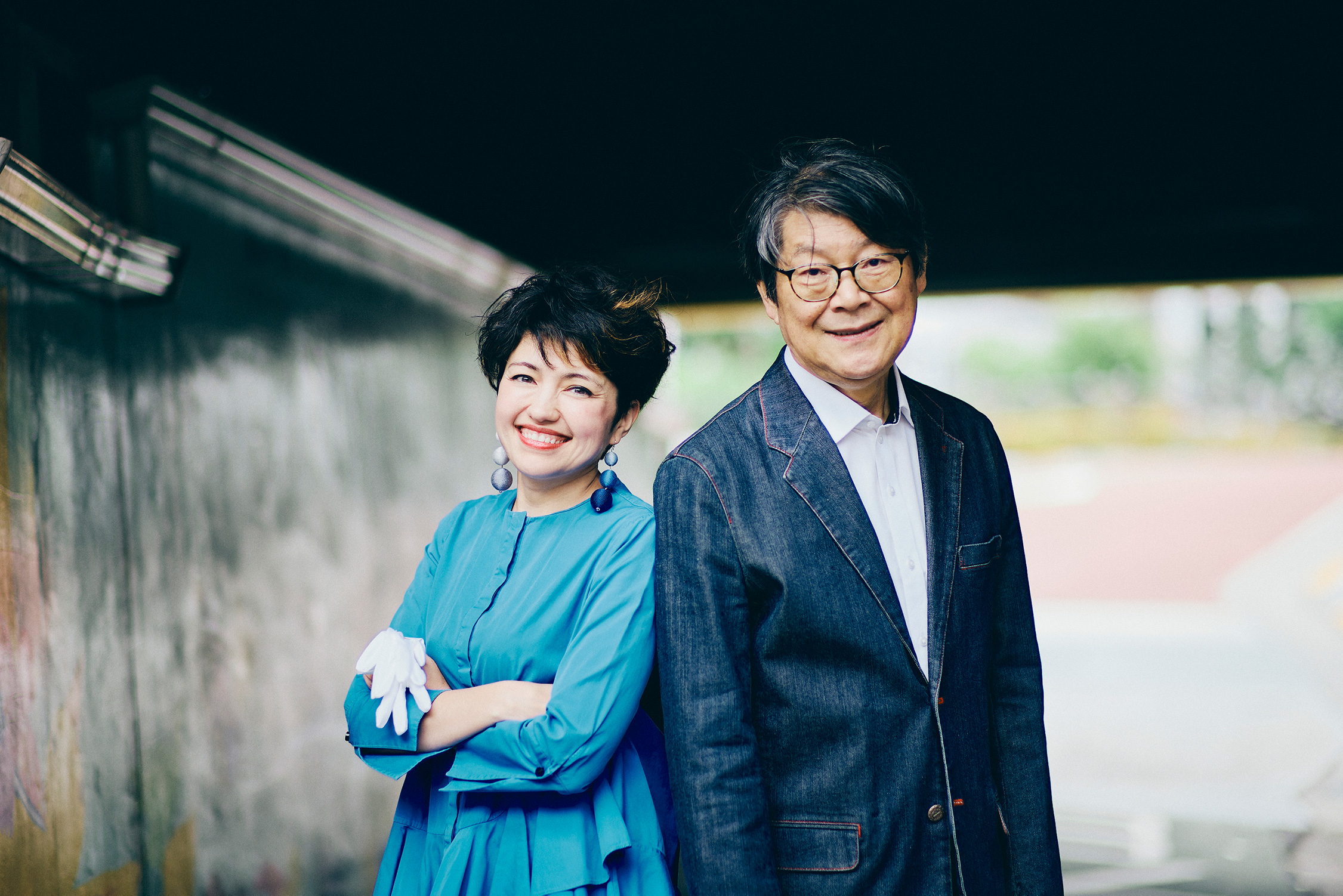
2024.06.20
The White Hands Chorus NIPPON performed Beethoven’s 9th symphony at the closing ceremony of “Zero Project Conference 2024” at the United Nations Office at Vienna in Austria last February. Performance where children could enjoy music lively and wholeheartedly, regardless of whether they have a disability or not attracted many people at the venue.
Why does the performance of The White Hands Chorus NIPPON touch the hearts of the viewers and shake their hearts?
What message does the White Hands Chorus NIPPON deliver?
目次
―First and foremost, what kind of group is the White Hands Chorus NIPPON?
Colon The White Hands Chorus NIPPON is an inclusive choir where children who are deaf, hard of hearing, visually impaired, developmentally disabled and those without disabilities enjoys music and creates performances together. It is located in Tokyo, Kyoto and Okinawa. There are approximately 100 participants throughout Japan. 60% of these children have disabilities, and the age group is mainly 6 to 18 years old. But adults can participate as long as they are 18 years old at heart.
The group is composed of a gestural part that sings with sign-language-based corporal expression and a voice group that sings in chorus. The gestural part wears a white glove and visually express music in sign language. We call this “Shuka (Hand singing)”. The gestural part are mainly deaf children, but hearing children also can participate. Everyone has their strengths and weaknesses, so this is a way for people to participate by making use of their strengths.
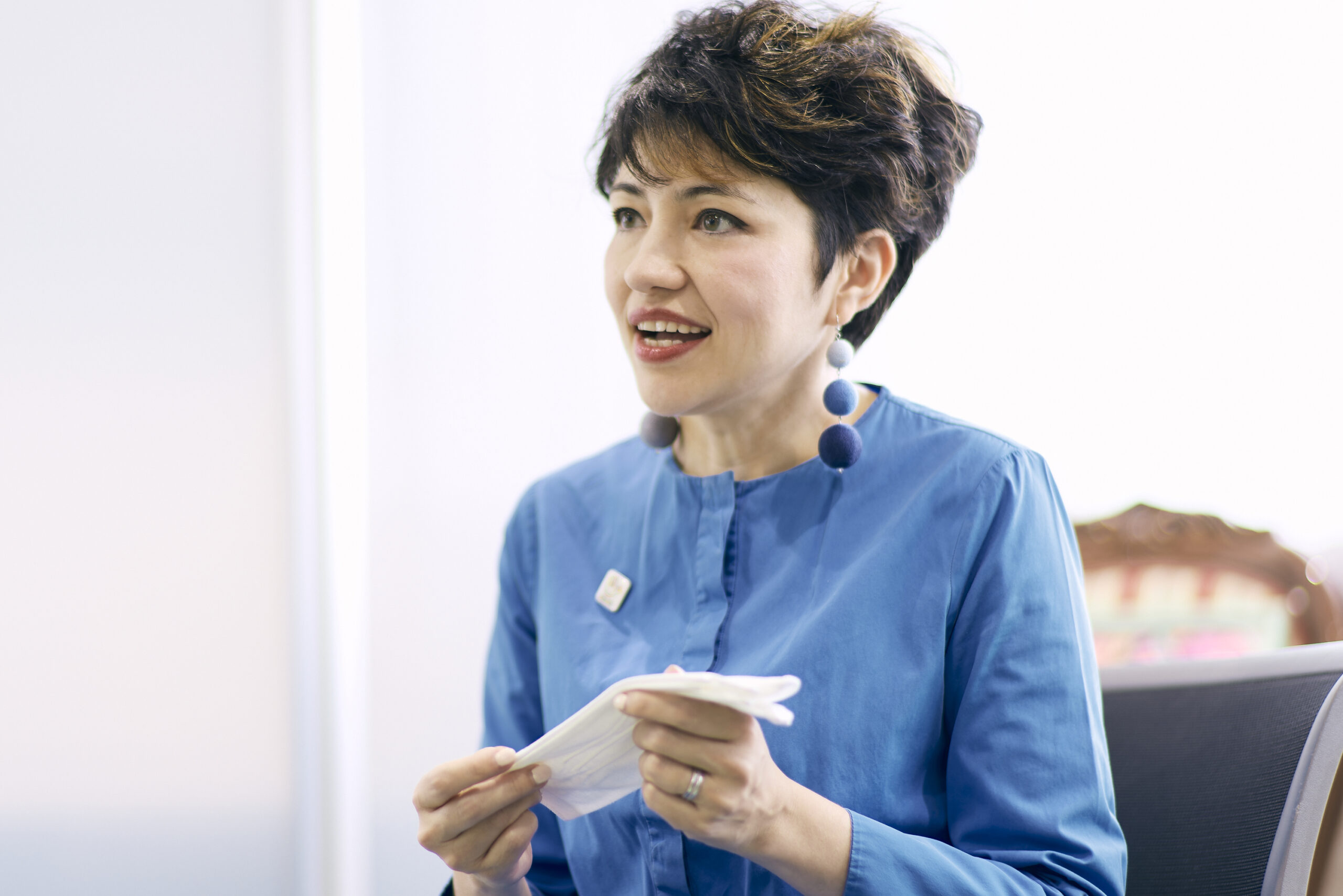
―When did you know about the White Hands Chorus and what did you feel about it?
Colon I think it was around 2010 that I met the White Hands Chorus. It started in Venezuela. There was a town where many deaf people were born due to pollution, and the social issue was how to solve communication problems in order to build a society with them. It all started when the Venezuela Conservatory of Music thought of an expression method called the white hand chorus.
I have studied music long before I met the white hand chorus. At that time, I haven’t seen any deaf going to a concert even though there is a saying that “music is universal”. I had my doubts that if people who can’t hear cannot enjoy together, then you cannot say that music is universal? I’ve always wondered if there was a way to share the music I love with people who can’t hear. So when I came across the White Hand Chorus, I thought, “This is it!”. When I saw deaf people truly enjoying music, far beyond my imagination, I was really impressed and thought “There is no more beautiful form of music than this”.
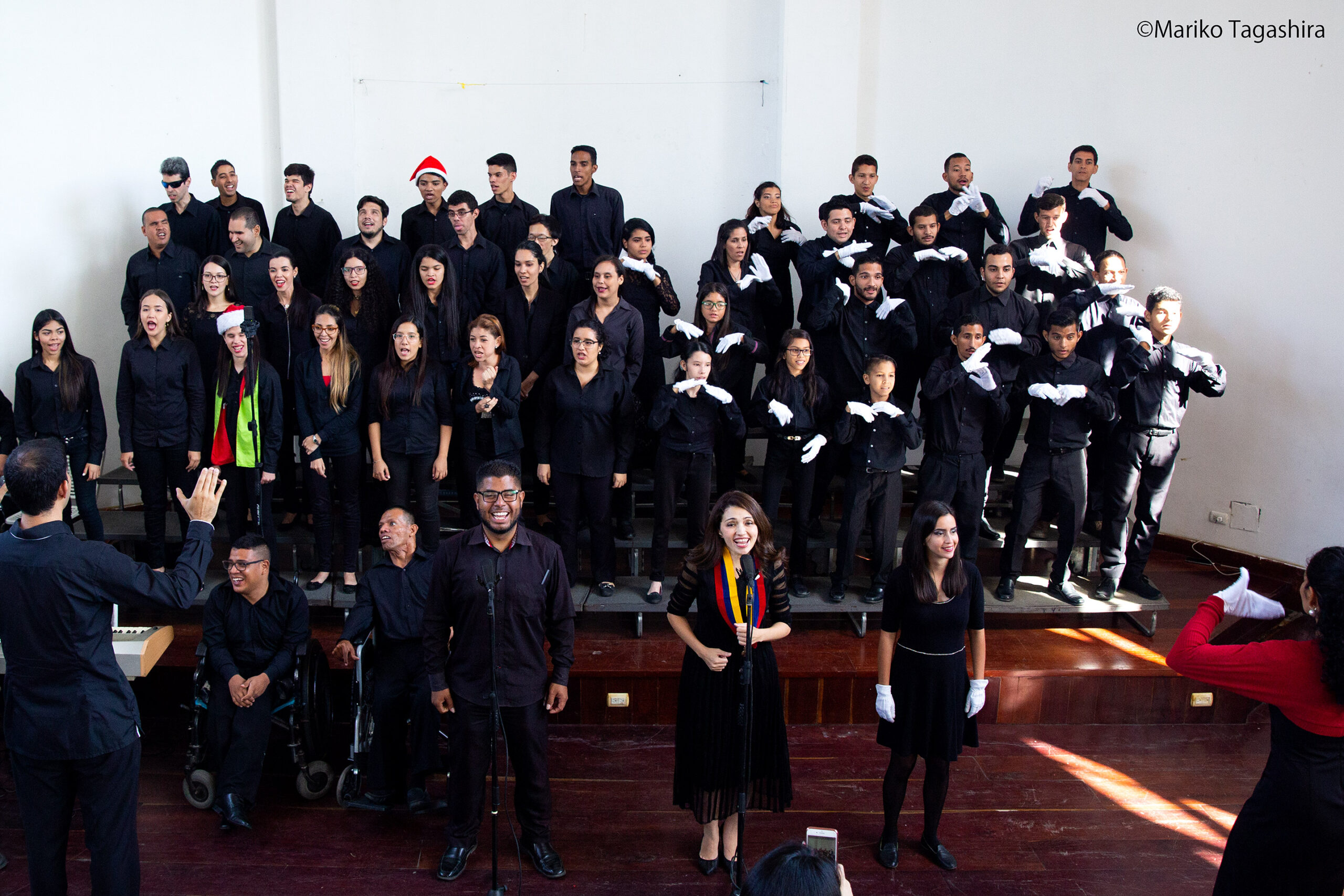
―Tetsuya Izaki, advisor to the Japanese Theatre of the Deaf, is the supervisor of hand song and gestural part teacher at the White Hands Chorus NIPPON. Why did you choose him?
Colon When translating something, not only in sign language, there are many things that cannot be translated directly. At that time, you have to think about what message you really want to convey and translate it in a way that will be understood by the other person. This requires creativity, imagination, and the ability to understand and communicate with others. Just translating the lyrics directly will not convey the music at all. Not just a sign language song, but I wanted to create works that take advantage of the power, expressiveness, and possibilities of sign language. I thought that only Izaki-sensei could make this happen. Izaki-sensei is a professional who has always mastered the art of “visual expression”. While sign language exists as a language, he has deeper expressions in sign “pantomime”* and expressive power as an actor. I rely on that power.
* sign “pantomime”:A method of expression created by combining elements of sign language (signs) and characteristics of pantomime. Unlike sign language, which has a linguistic meaning, it uses fingers, hands, arms, and facial expressions to describe scenes and psychology.
―What did you honestly think when you heard about this from Erika Colon?
Izaki When I first heard this, I had a strong desire to refuse. Because I had an inferiority complex about music. This is because up until now, there has been a situation where people who could hear were teaching music to people who couldn’t hear. There have been many people who thought that music is counted by hearing people and deaf people match it, so deaf people are able to make music thanks to the hearing people. I’ve always felt uncomfortable with this situation. That’s why I couldn’t receive the songs and music favorably.
The other reason is due to my experience at a deaf school. The school that I went to had a school play once a year, and the students performed musical instruments. That’s why my mother bought me a xylophone. I was so happy with the shiny xylophone that I practiced hard… Although, when the actual performance came around, I couldn’t perform well because I was worried about so many people looking at me. I was really shocked when my teacher severely scolded me after I finished my performance… Since then, I’ve always hated music and wasn’t good at it. At first I reacted with rejection. But when Erika showed me the video of the White Hands Chorus, I was surprised to see that deaf people can express music. Erika tried her best to explain to me about the White Hands Chorus, and she said “Let’s do it together.” At the end, …she sang to me.
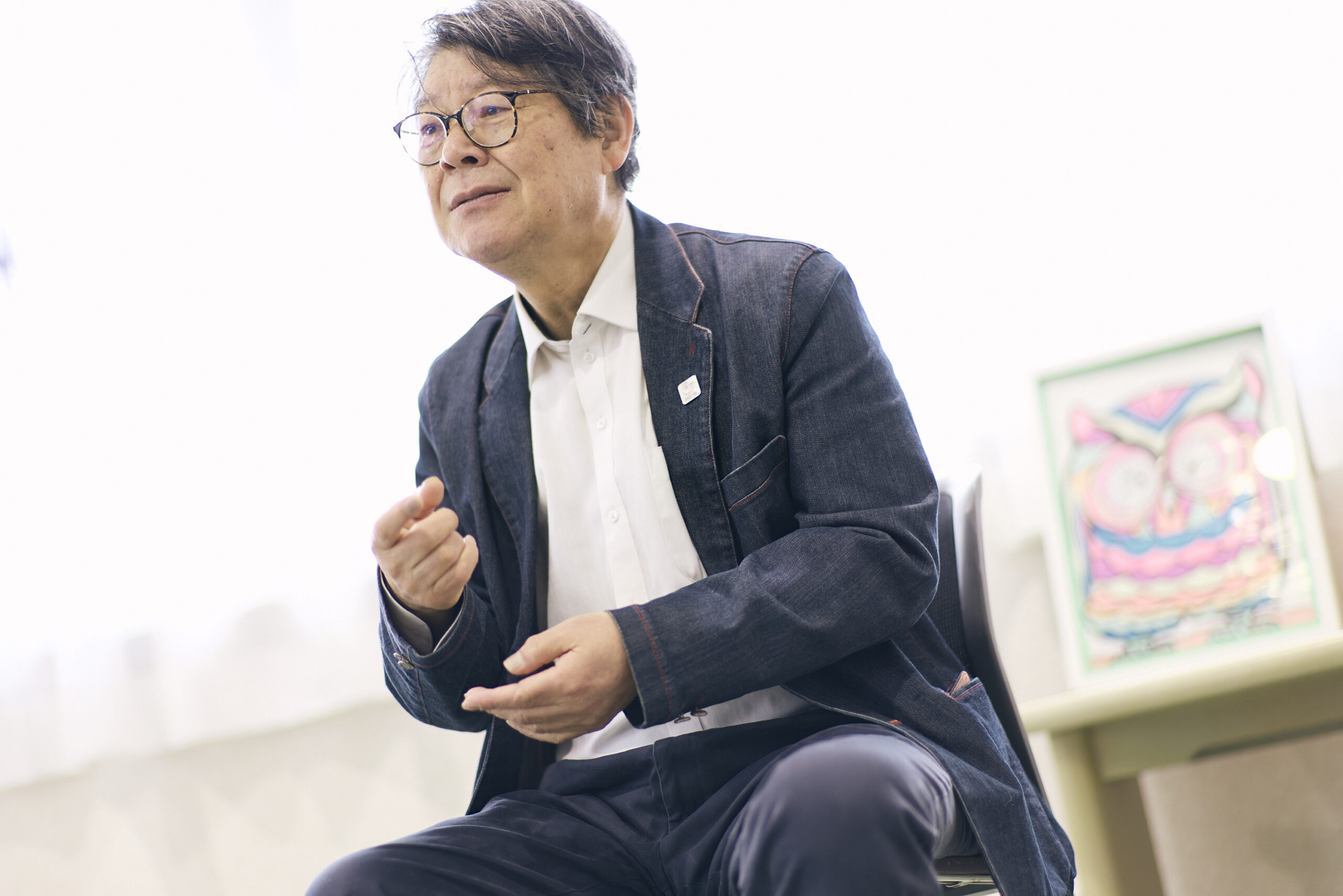
―What! What do you mean?
Colon Izaki-sensei turned me down once. But I couldn’t give up, so I thought I had no choice but “to sing in front of him”. Communication beyond words, I sang ”Hymn to Atomic-Bombed Statue of Mary〜Ave Maria ” believing in the power of music.
Izaki When Erika sang this song, I thought what is this song! I felt like I had goosebumps and was even moved. I couldn’t hear it, but I could feel it. It was my first experience and I was really shocked. Erika’s enthusiasm came through the song. That is why I decided to accept the offer. Meeting Erika changed my way of thinking about music and I don’t think this would have happened if it had been someone else.
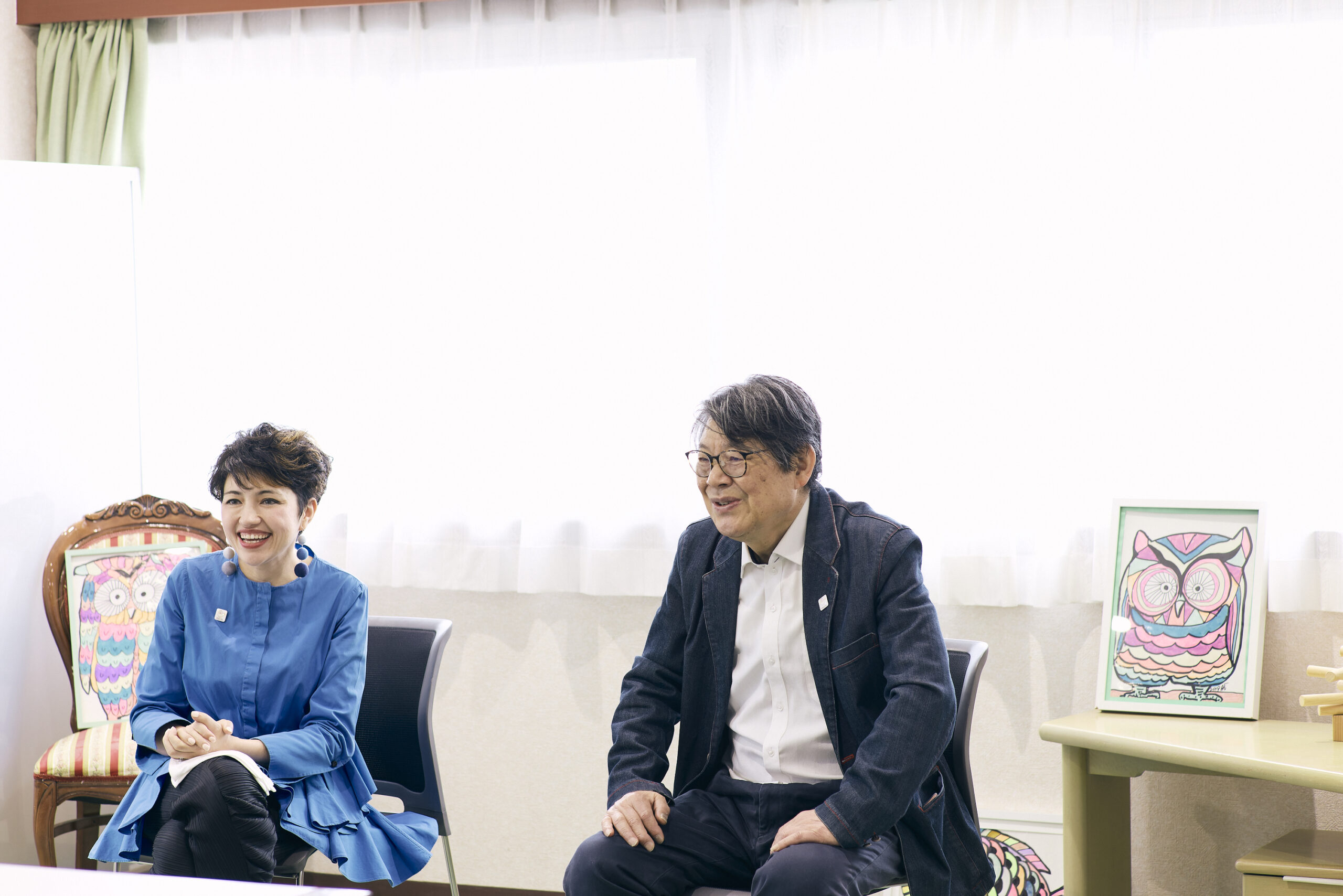
―It was the power of music that was able to persuade Mr. Izaki. Has Erika had any previous experience communicating with deaf people through music?
Colon The first time I met a deaf person was at a school for the deaf that I went to for two days as a teaching practice when I was a student. The children asked me what do you like and when I answered, “I like to sing without thinking about anything,” they asked me to do it. Even though I had been performing on the music stage since I was 6 years old, for the first time I was at a loss as to what to do… I started singing with all my might thinking that ”I just have to look them in the eyes and sing”, and at that moment the children started leaning their bodies toward me. I felt that these children were trying to listen with their eyes, and I was very impressed. When we look at each other, there’s something we can communicate, and that is when I thought that it is not true to say “If you can’t hear, you don’t understand music”. Although I did not understand what it was at that time.
The White Hands Chorus NIPPON not only enjoys the sound and rhythm of music, but creates and delivers the music. I became convinced that people who cannot hear can also enjoy music through the process of creating and delivering music. Unlike my previous intuition, I was certain about this. Thanks to the presence of people who cannot hear, the possibilities of music expand, and even among those who can hear, there are many who wish they could see music. The deaf children make a song into a picture. Its splendor is truly important existence that opens up new frontiers for music as an art form.
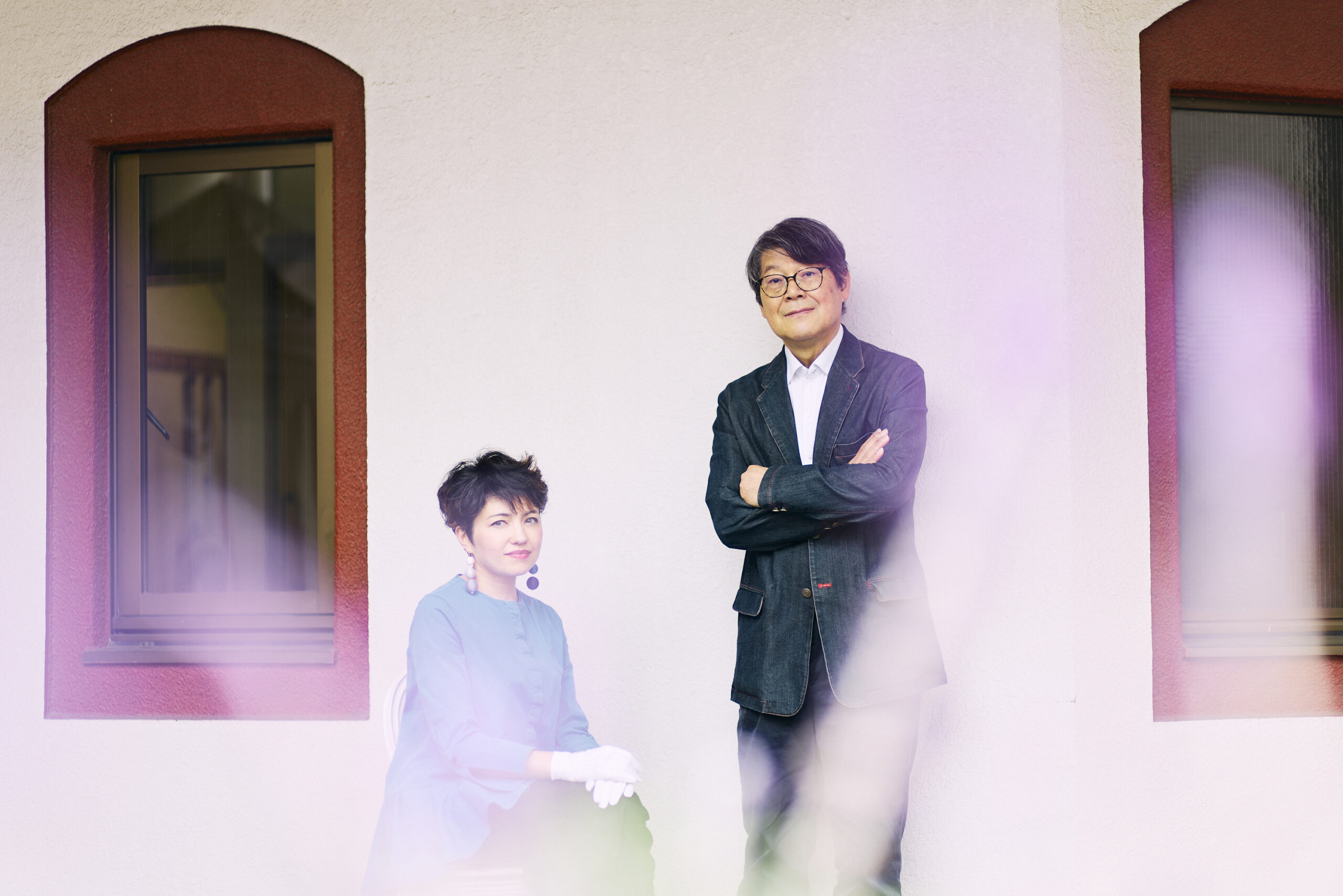
―How does the White Hands Chorus NIPPON create songs?
Colon The voice group has sheet music, so they will first memorize the sheet music. Children who are visually impaired learn by ear, and once they have memorized the lyrics, they can memorize the sounds and be able to sing along with the sheet music. Once they are able to sing smoothly, they will begin to improve their expressiveness by interpreting the meaning of the lyrics and the messages depicted in the music, and gradually creating the “color” of their voice and refining their expression. At the final stage, when the gestural part sings with the voice group, the gestural team explains why they are translating the lyrics this way. By working together with the voice group and the gestural team, the meaning and interpretation of the song deepens, and the expression is further refined. It’s always exciting to see the process.
―How does the gestural team proceed?
Izaki We help them learn words and expressions through free thinking. For example, when you ask the children how they can express the phrase “catching fish”, there are many ways to catch fish, such as fishing with a fishing rod, fishing with a reel, scooping with a net, and stabbing with a harpoon. We think together how to express it with our hands. When children start to feel the fun of expressing and communicating with their hands and enjoy it in a sense of play, they will be able to give various opinions. We choose from the ideas that come up and refine their expression. Although the children cannot hear, they participate thinking that “music is fun” and I feel that they are actively enjoying the fact that they cannot hear. As they begin practicing, they will gradually gain confidence and their sign language comes alive!
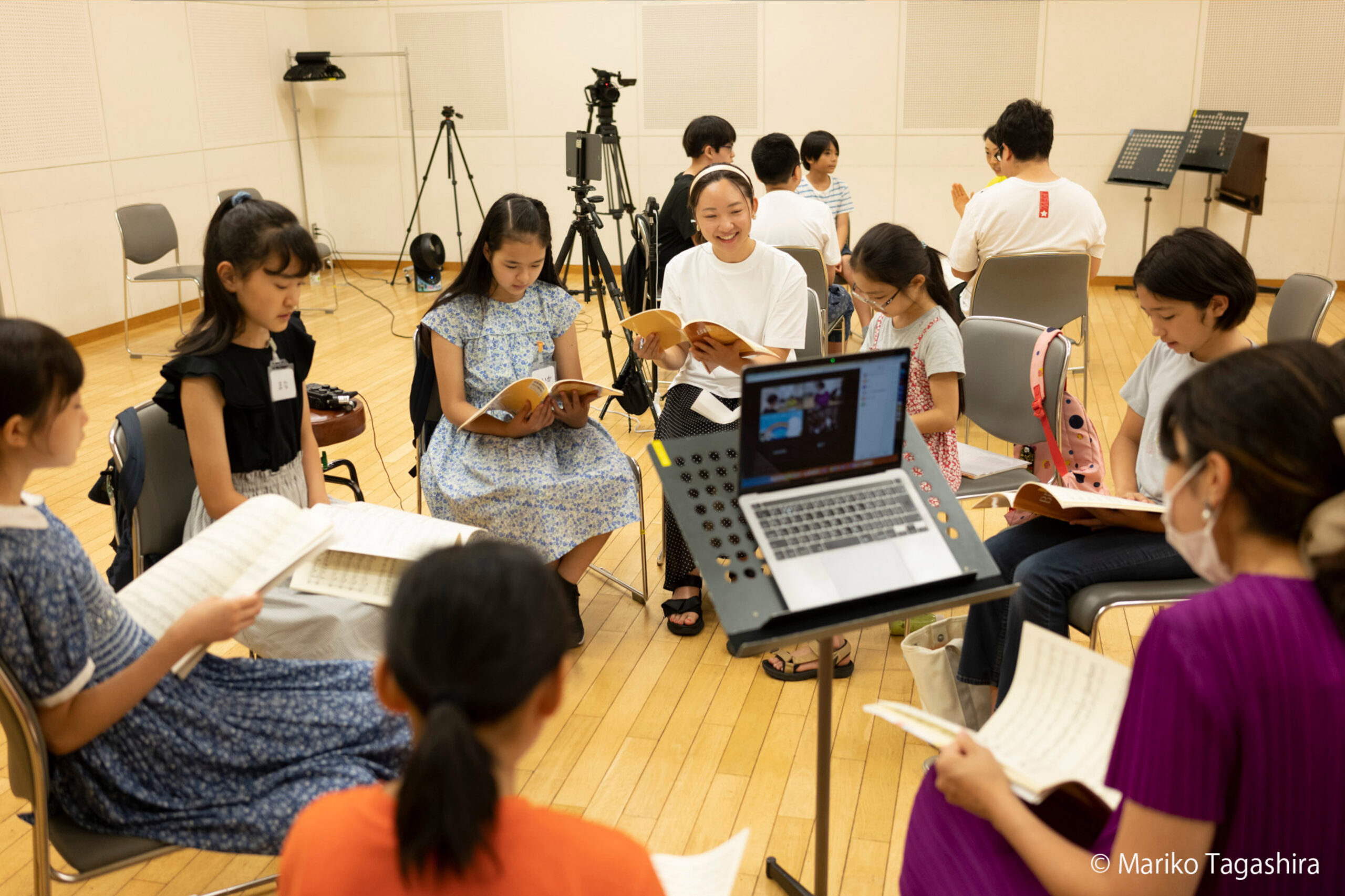
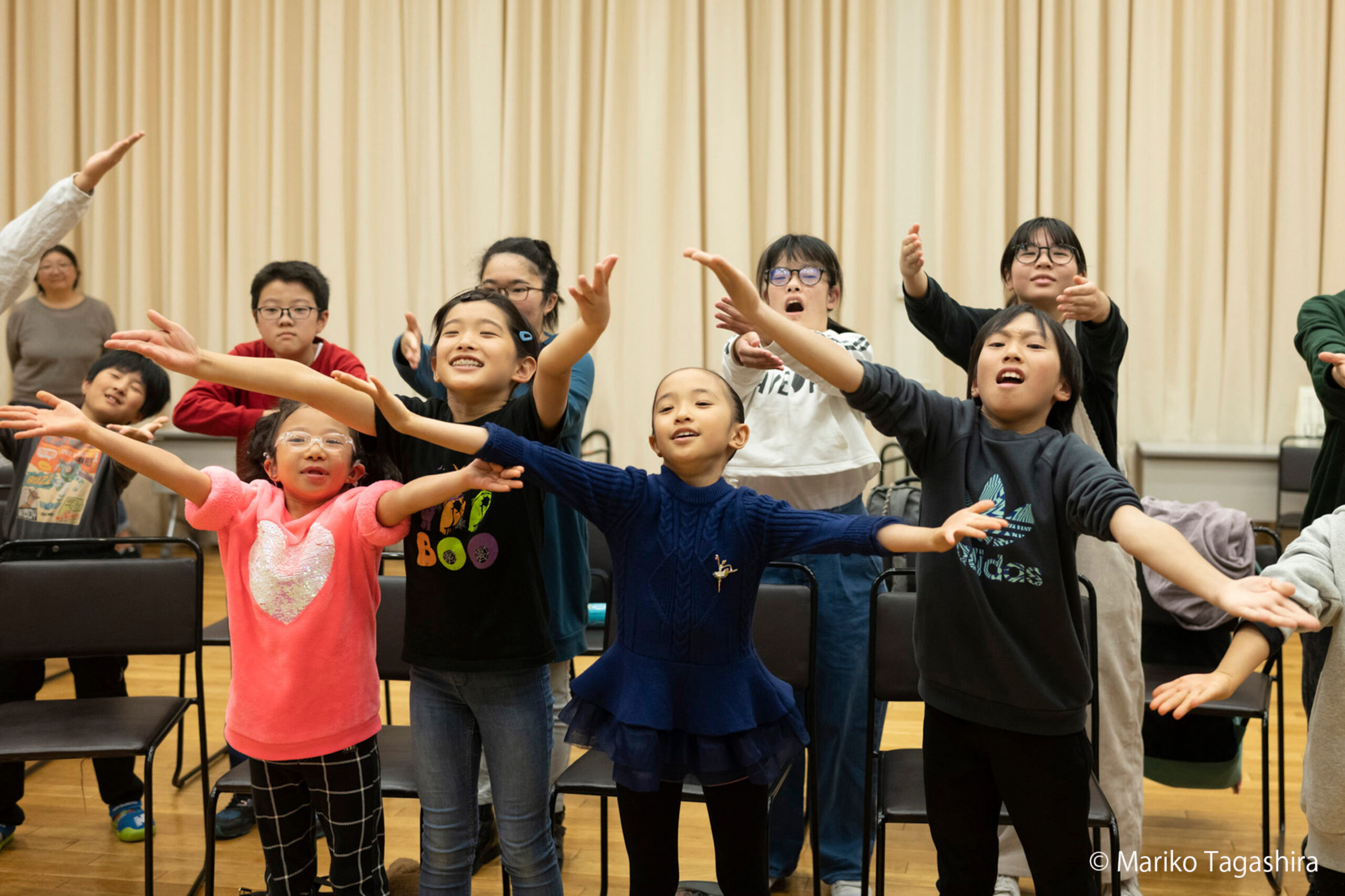
―There are a lot of children in the group, what do you keep in mind when interacting with them?
Colon We do not treat them like children when creating the hand song, but treat them as “an equal relationship created together.” When we create hand songs in workshops, we come across many new expressions that are different from the sign language used by adults. Sign language is evolving as children live with a new sense of the times. That feeling is something that adults should never destroy.
Izaki I praise to encourage improvement. Forty years ago, I participated in a theater company for deaf people in America, and the teaching style there was completely different from that in Japan, where they just praised the good parts. This was common in America, but in Japan, there was a lot of instructions that criticized them by saying “that is wrong”. I don’t like being scolded either, so I use a method of praising to encourage improvement.
―Where did you experience the “new sensations” of children?
Colon I have won the “Zero Project Award” in February which is awarded to organizations and companies who spread the idea of the Convention on the Rights of Persons with Disabilities. There is a hymn to this “Zero Project”, and it is translated into 19 sign languages. But since there was no Japanese Sign Language version yet, we decided to create an official Japanese Sign Language version using hand songs! The song has lyrics, “Disabilities are created by society, and people with disabilities don’t need barriers.” In Japan, when referring to people with disabilities in sign language, an expression that can also mean “broken people” has been used for a long time. As adults, we thought that if it was the official version of Japanese Sign Language, we would have to use that sign language to translate it “correctly.” However, the children started saying “I can’t hear, but I’m not broken. Why do we have to be called broken people?I don’t like using words like this”. That’s when it suddenly hit me. Now adults are asked how to respond to children’s opinions. I realized that I can’t force my children to use the sign language “broken people”. I strongly felt that we must spread awareness that “People with disabilities aren’t broken, it’s society that is broken”. After much discussion and many months of searching for a replacement for the translation of broken people, we finally incorporated the children’s opinions and came up with the idea of “various people with unique personalities”. Not only in Japan, but also in International Sign Language, people with disabilities are expressed as having “no hands”. Words that contain incorrect ideas unconsciously carry biased thinking. I realized how important it is to change that.
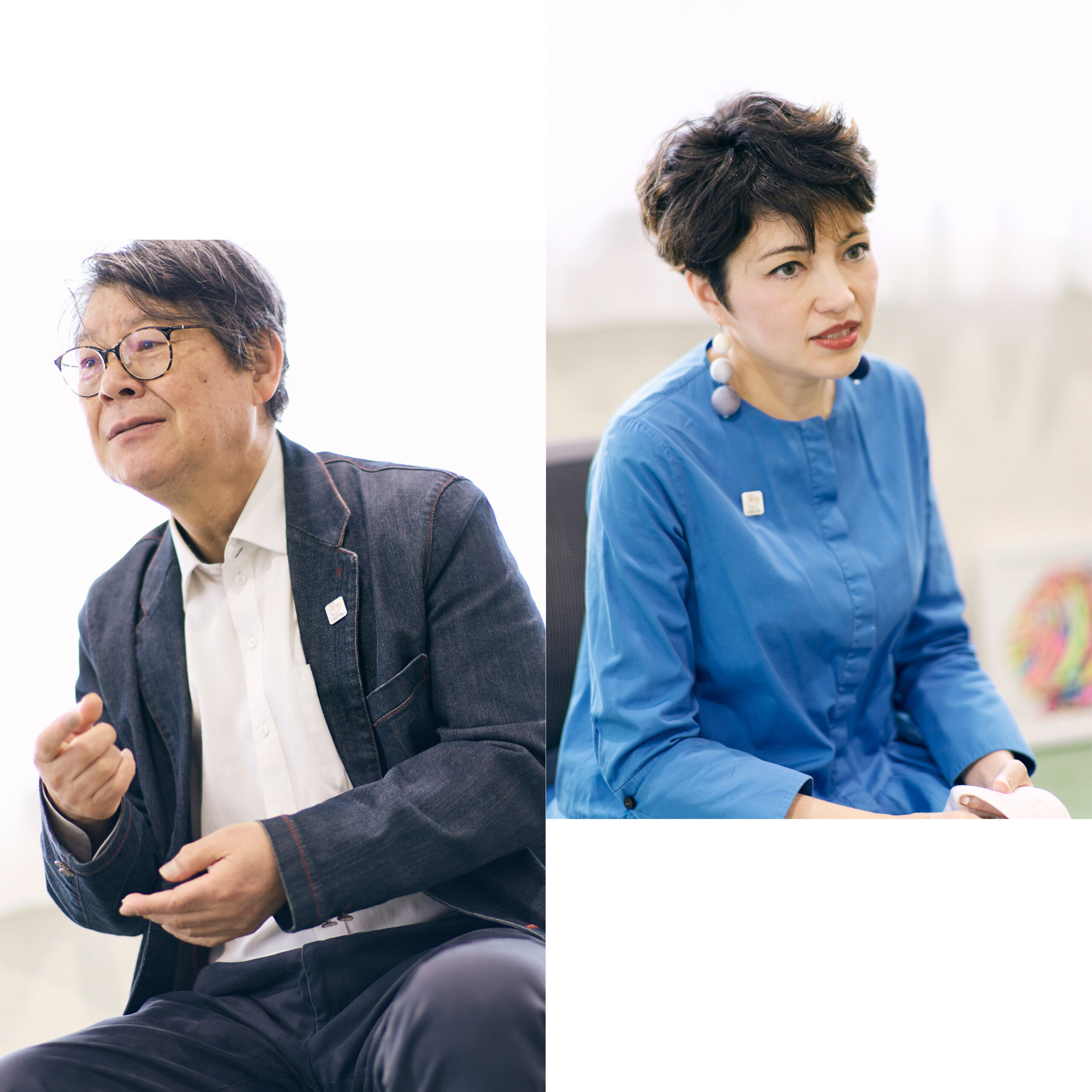
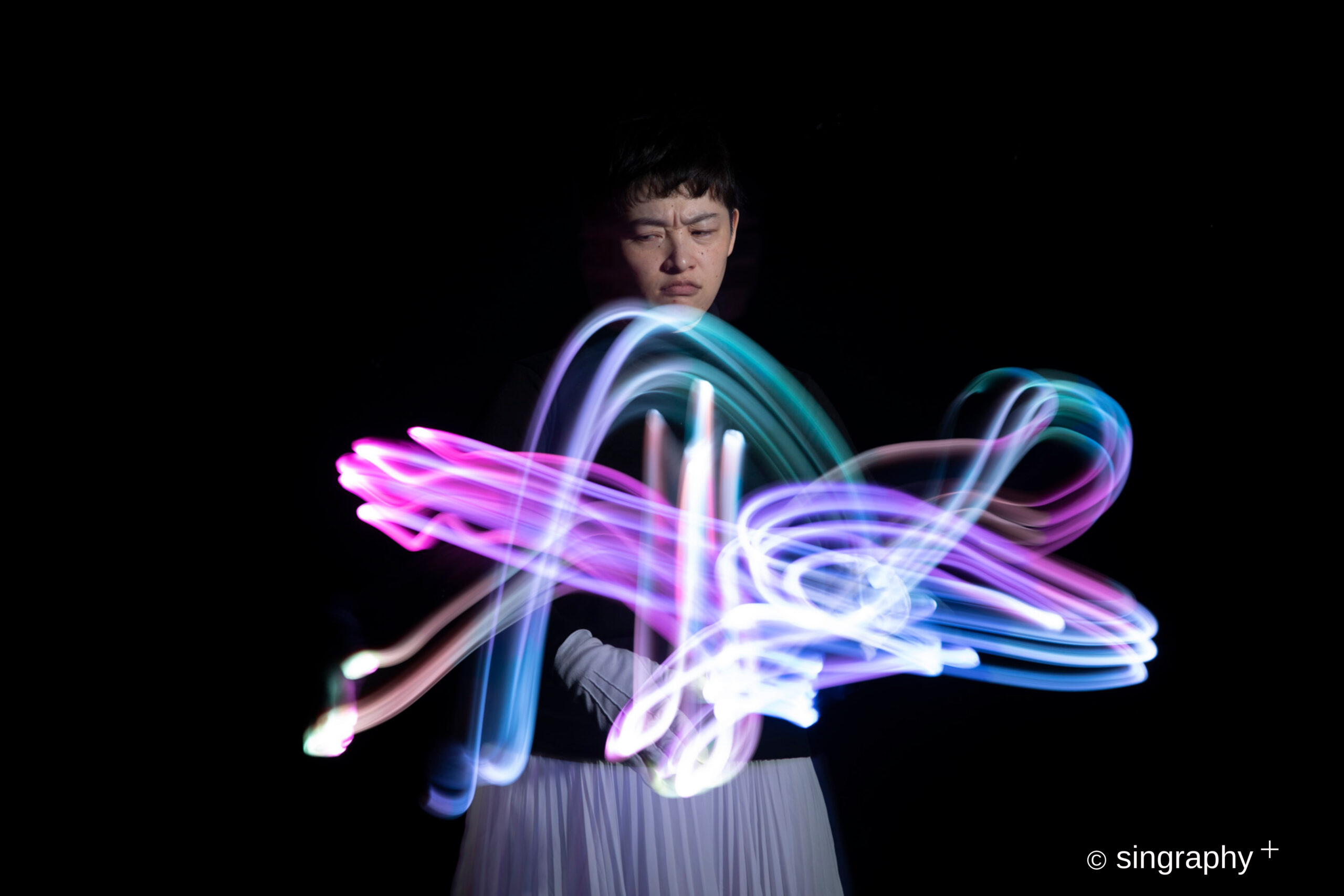
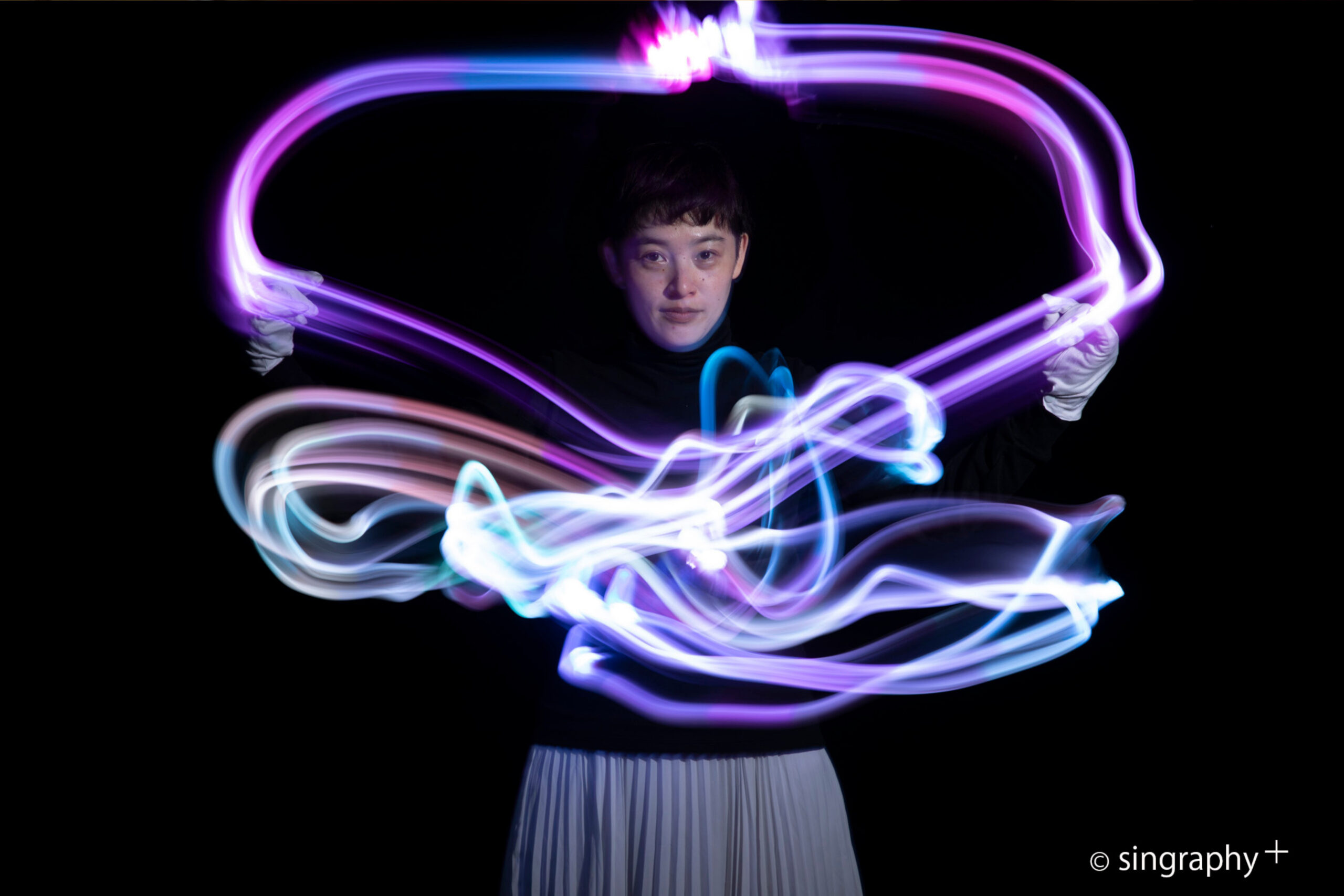
Izaki I myself was shocked by the children’s opinions because I was used to using sign language to describe people with disabilities as “broken people.” I was surprised to hear such ideas and that they have such courage. My generation often had to adapt to the world of hearing, such as having to learn oral language but with the help of young people, things are changing little by little. I thought that children’s opinion made sense, so I worked with Erika and the children to come up with new words to express it.
―There are many things to learn from children. I believe that children will grow and change through the activities of the White Hands Chorus NIPPON. Are there any memorable episodes that you watched up close?
Colon There are too many! One of it is the episode about a deaf girl living in Kyoto. She joined the chorus group in the lower grades of elementary school but her mother was debating whether to raise her using sign language or oral language at that time. However, as she learned how to use sign language, correct expressions, and vocabulary in the chorus group, she reaffirmed her identity as a sign language user. Accepted by others. It changed through her experience.
Now she is in the 6th grade of elementary school but she has a strong will to “determine her own life”. When she paid a courtesy visit to the mayor of Kyoto, she sent a letter asking to “please assign a teacher who can use sign language to a school for the deaf.” Even though she is an elementary school student, she feels that we have to create this society by ourselves, and that we have to change what we can. Her experience in the chorus group has given her more confidence by starting to have the feeling that not just performing on stage, but since everyone is an important member of society, we should make our own decisions about society.
―As children grow up, the adults surrounding them may also change?
Colon I would like to introduce an episode from the perspective of the children’s parents. From the time we practice, we make it a point for the children to help each other on stage, without the help of the adults. Some children are completely blind, but the children are the ones who guide each other about where to stand on stage. In one performance, a child who can hear and see had to guide a completely blind child named A-chan. The position on the stage was constantly changing, and there was a lot to remember as it was complicated, and there was a strained atmosphere on the stage. During this time, the child who had to guide the blind child overheard someone say, “That child can’t see, so she won’t be able to remember where to stand anyway.” She came to me crying saying “Why would you say such a horrible thing to A-chan, who is just blind and who remembers the lyrics before anyone else and who we rely on? It’s frustrating, but during the actual performance, I’ll definitely guide A-chan without making any mistakes and provide a perfect performance together”.
After hearing that story, I explained the situation to A’s mother and asked how she was doing. A’s mother said “She is fine. That kind of thing happens every day. She has been accepting all of that since she was little, so she is fine with it”. A’s blind body is part of her identity and she is proud of it. “What’s important is who she wants to be, and it doesn’t matter how other people see her”. Hearing this, the child who gave the guide was surprised and later received a letter from the guide’s mother. “When I was raising my child, I tend to compare my child to other children, so she got into the habit of comparing oneself to other people in everything and before I knew it, she lost self-confidence. I don’t know how much important things she learned from A-chan, who lives her life with a strong sense of her own identity. We were the ones who were really guided”… This kind of awareness can only be created when a variety of people are involved and connected. This is an episode that made me realize how much everyone can learn from working together on something as equals.
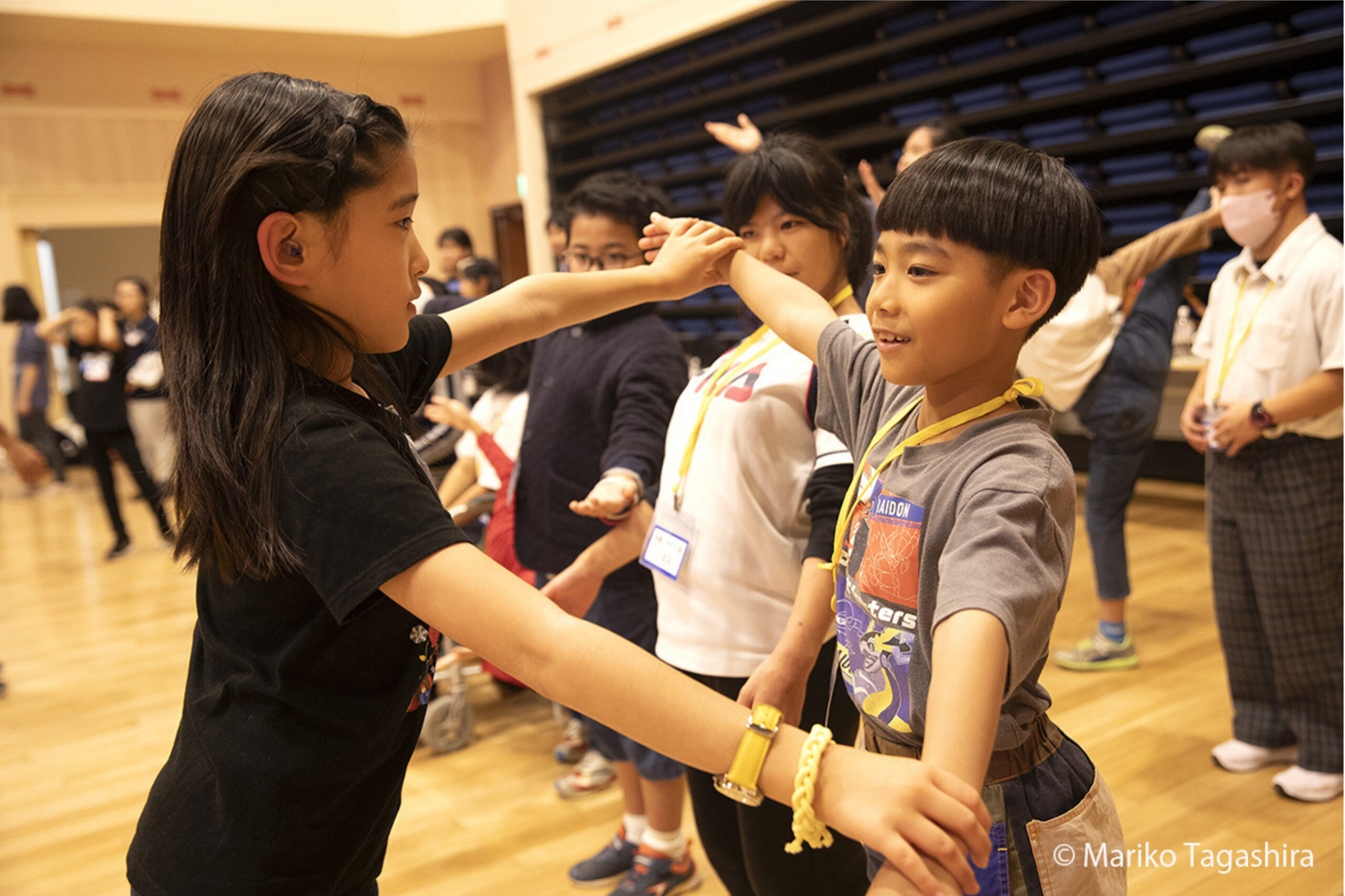
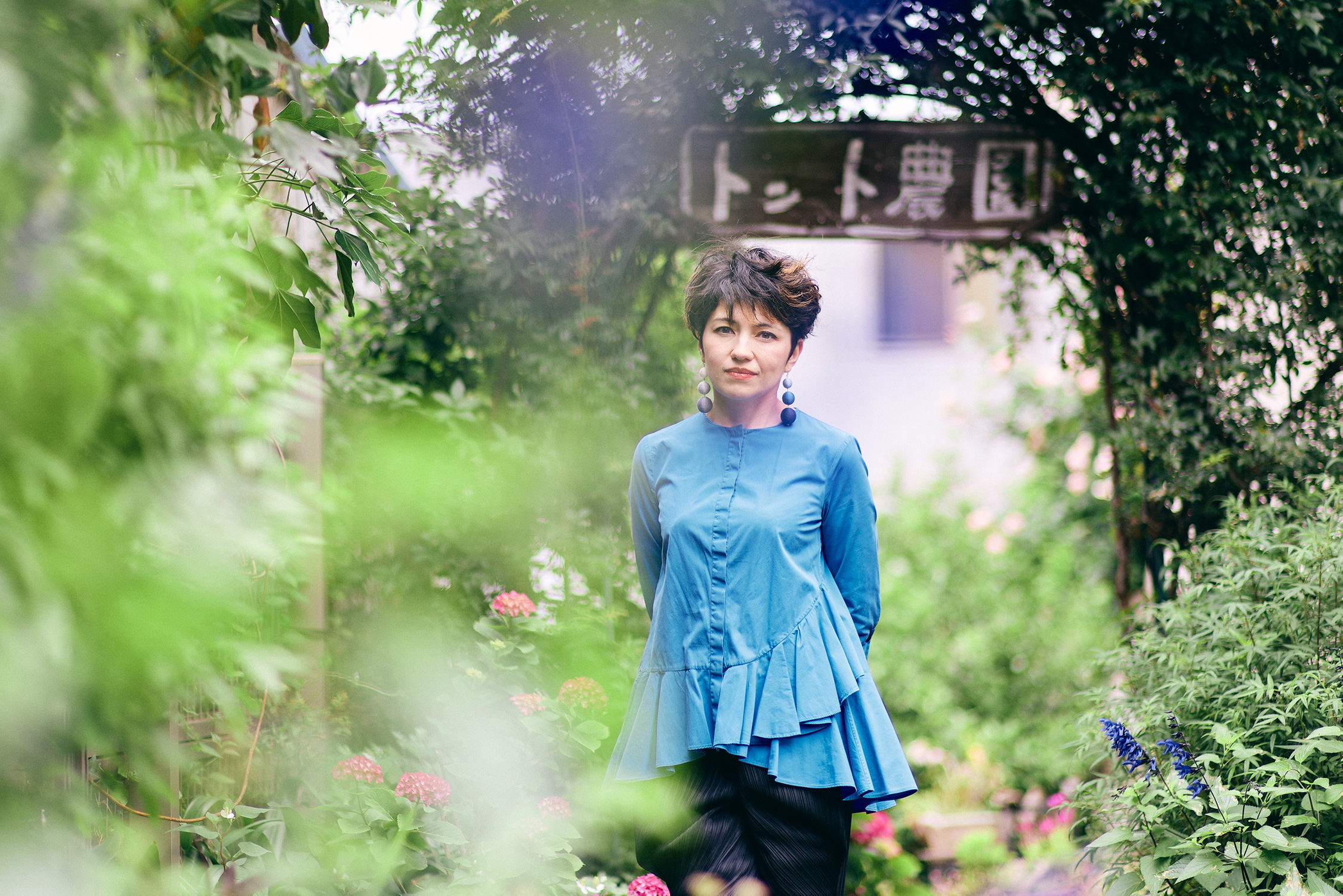
―You performed Beethoven’s 9th Symphony at the closing ceremony of the ”Zero Project Conference 2024”. Please tell me your thoughts you put into this song.
Colon Beethoven’s 9th Symphony is the world’s first symphony with a “song” by the human voice and based on a poem by Friedrich Schiller, but actually Beethoven himself added the first part of the lyrics. The lyrics that he added himself starts with a denial “No, it’s not the same music as before” and the lyric continues “Let’s sing a song full of joy that is different from the music of the past”. “Joy” in Beethoven’s 9th Symphony is not just about having fun, it sends a message that “once you overcome all the pain, division, and natural assumptions that exist in human society, there is joy that can be shared”. As the lyrics say, the best reward for me is the joy shared after overcoming it. It is really important to feel the same joy with various children. My driving force is the desire to share the things that moved me with many people.
Izaki I never thought of the deeper meaning of this song until I started performing Beethoven’s 9th Symphony. That is why I always wondered why it was still being played all over the world. I was actually in the hospital when it was decided that I would be performing, and Erika brought me a book about Beethoven’s 9th Symphony. When I read it and understood its deep meaning, I felt motivated from deep inside. Full of enthusiasm, I proposed to Erika, that “I would love to be on stage!”
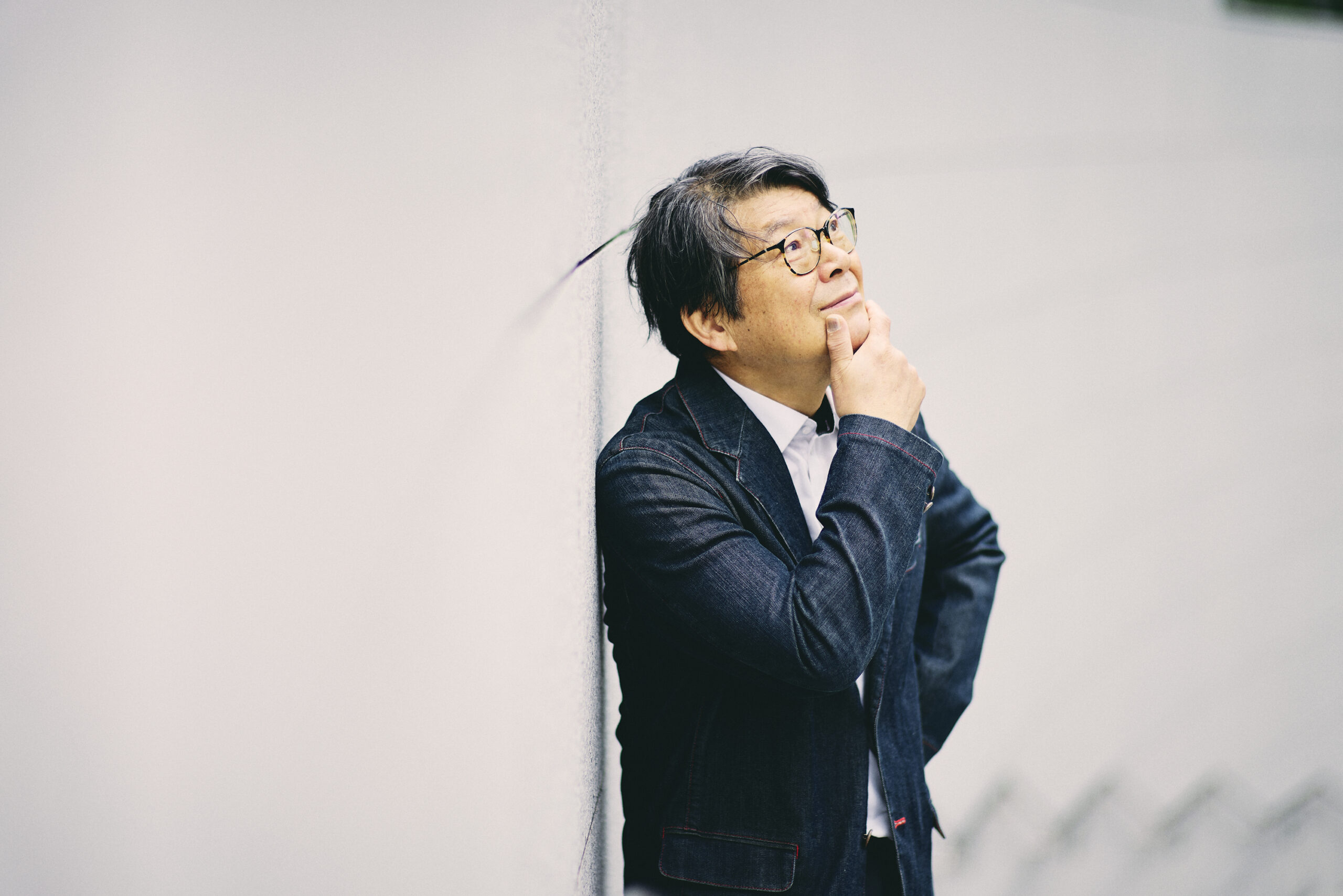
Colon On stage, a baritone singer sings a solo part written by Beethoven. There are four vocal soloist and four gestural parts soloist. I was thinking that if we had two people who can hear and two people who can’t hear, they could do it while supporting each other. But the teachers said “All four soloist must be deaf”. I thought it made sense when I heard that. So when it came to decide who will take on this important role, I thought Mr. Izaki wouldn’t be able to do it because he was in a teaching position, but he told me he wanted to do it. Mr. Izaki knows everything about Japan’s deaf culture and the pain faced by deaf people, including the time when sign language was banned in schools. If you have that history in mind, Beethoven’s 9th Symphony, which begins with “this is not the same music as before,” is really perfect… So I was moved to tears when Mr. Izaki told me that he wanted to be on stage.
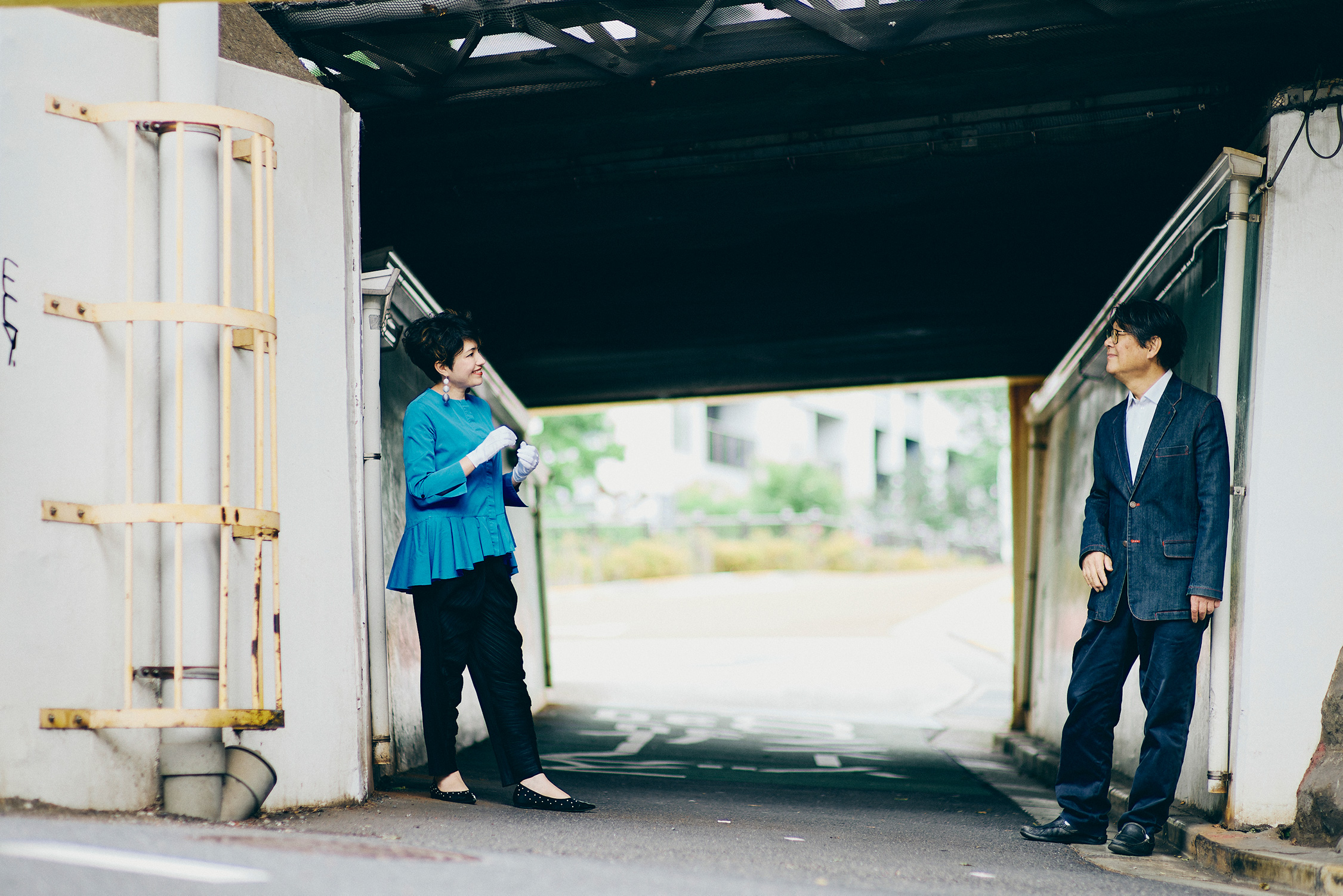
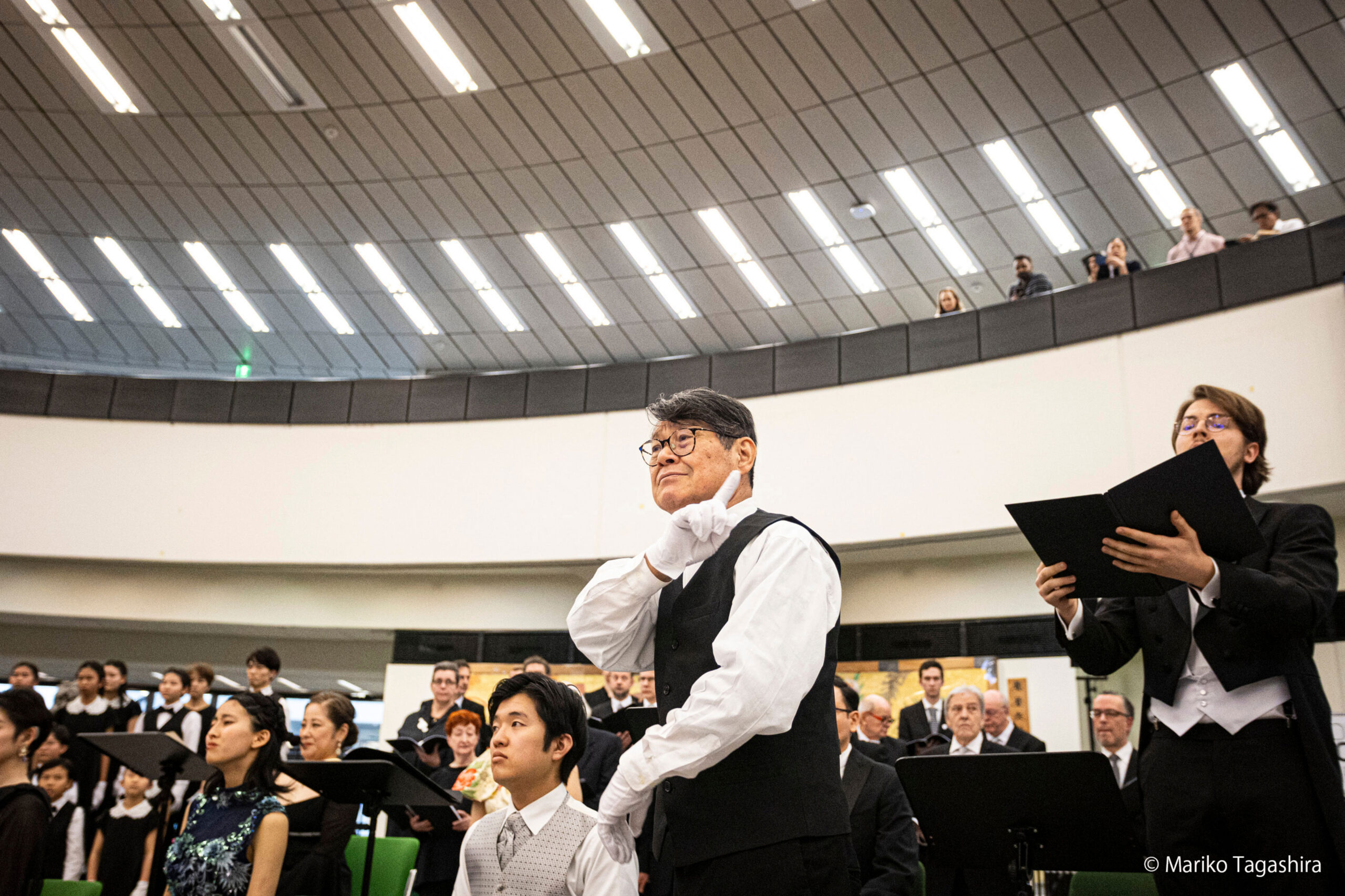
―The White Hand Chorus NIPPON is continuing to expand its range of activities by performing at home and abroad. Please tell us what you aim for in your future activities.
Colon The children are asking me when is the next overseas performance. Of course, I want people all over the world to see the beautiful expressions of Japanese Sign Language. At the same time, while some deaf people, like Mr. Izaki, have come to dislike music because they are forced to listen to the music of people who can hear, I want children around the world to know that “music is something that connects people”, and that both people who can’t hear and people who can hear can enjoy it together. To this end, we are currently creating a model of how we can expand our activities.
Izaki After discovering the White Hands Chorus and falling in love with music, I began to think that there were more ways for deaf people to enjoy music. Is it about clapping your hands and shaking your body to create a groove, or is it about raising your feet and hands in unison? I’m trying to figure out the style of music that deaf people can enjoy. I want to find and spread the method that works for people who cannot hear. I want to express artistically what deaf people have that hearing people don’t have and express the hand songs beautifully.
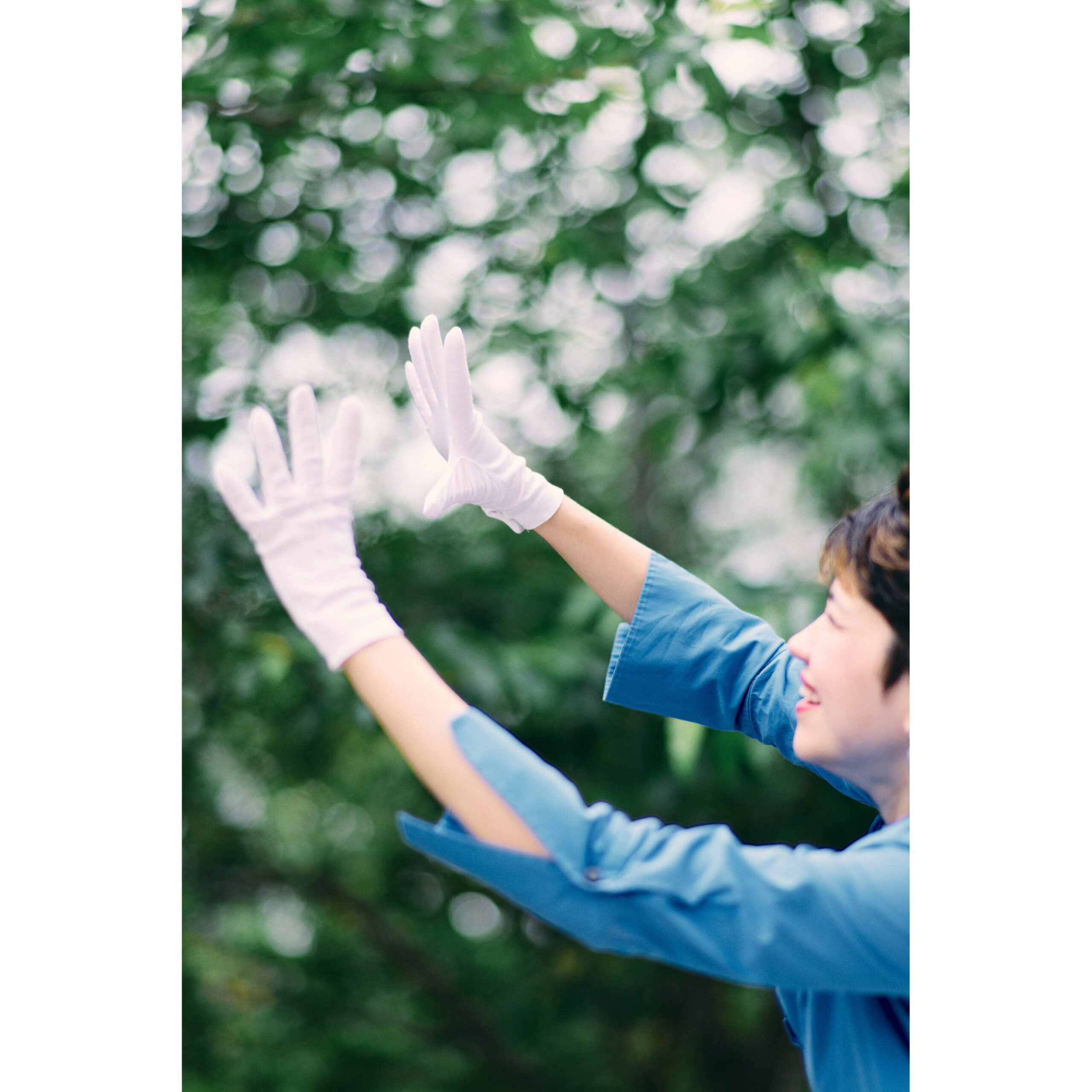
―What do you want to convey through your activities with the White Hands Chorus NIPPON?
Colon In Japanese society, providing reasonable accommodation to people with disabilities has changed from an obligation to make efforts to an obligation. It’s great that the system is moving forward, but people’s awareness of barrier-free access still hasn’t caught up. In that situation, I think there are some people who will have heavy feelings when reasonable accommodation becomes an obligation. I want people to realize that diversity, inclusion, and equity are the sources of explosive innovation. The children of the White Hands Chorus are truly bringing the future of inclusion to life on stage and showing us that an inclusive society can be fun. We can make Japanese society a fun and comfortable place just like the stage we are creating. So first of all, I would like you to come see the White Hands Chorus stage performance and take a peek into the future of inclusion.
Izaki There are still many people who are hard of hearing who don’t like music. In the past, when I saw songs by people who could hear, I often felt that they didn’t suit me, and I certainly thought that music activities were about making money. That is an old fashioned idea now. But that idea is still rampant in the hard of hearing world. I hope that sign language will spread more widely among people who can hear, and that we will be able to get to know each other. I want to eliminate the stereotype that people who cannot hear think that “singing is not interesting”. Seeing both hearing and non-hearing children smiling and enjoying music has a great impact. That’s why I want to do activities that bring smiles and fun to children of all kinds, each with their own individuality.
―Deaflympics will be held in Tokyo in 2025.What are you looking forward to or hoping for at the Tokyo 2025 Deaflympics?
Colon When we held the hands-on photo exhibition “The Ninth Creation” in Austria, the children tried their best to communicate using sign language expressions that they knew, even if they could not speak a foreign language, and explained the meaning of the lyrics of Beethoven’s 9th Symphony to foreigners just by using their bodies, hands, and facial expressions. Looking at that, although there are aspects of language and culture that must be carefully preserved, I was moved by the preciousness of the desire to connect with others that transcends that. I’m really looking forward to seeing deaf people from various countries come to Japan, creating new connections, and expanding the world of Japanese children.
Izaki 2025 is exactly 100 years since the first Deaflympics was held in France. I thought it would be great if I could express myself by hand singing even just one song during the commemorative competition. I would like to convey my thoughts to the people involved every time I have the opportunity to strengthen my influence.
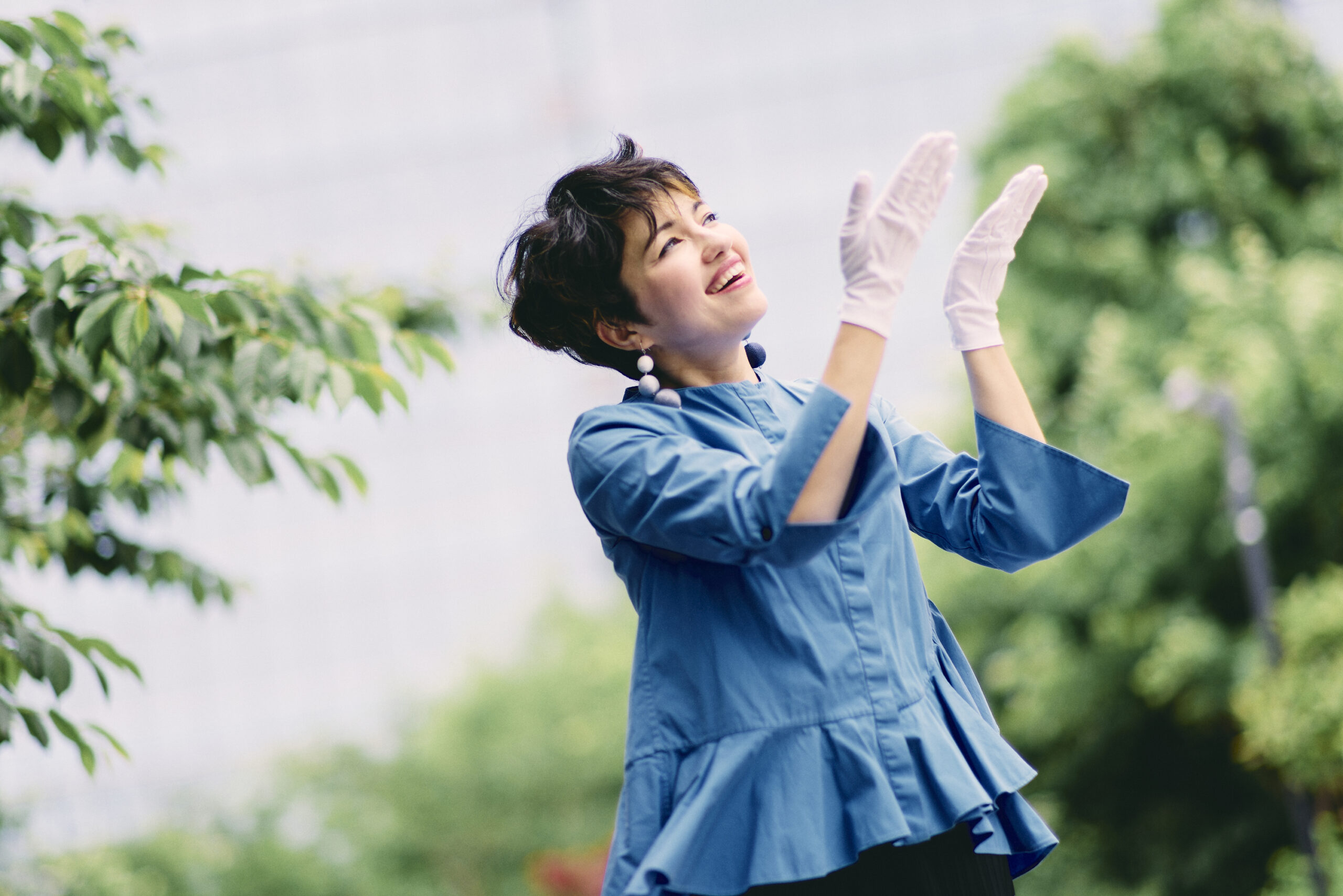
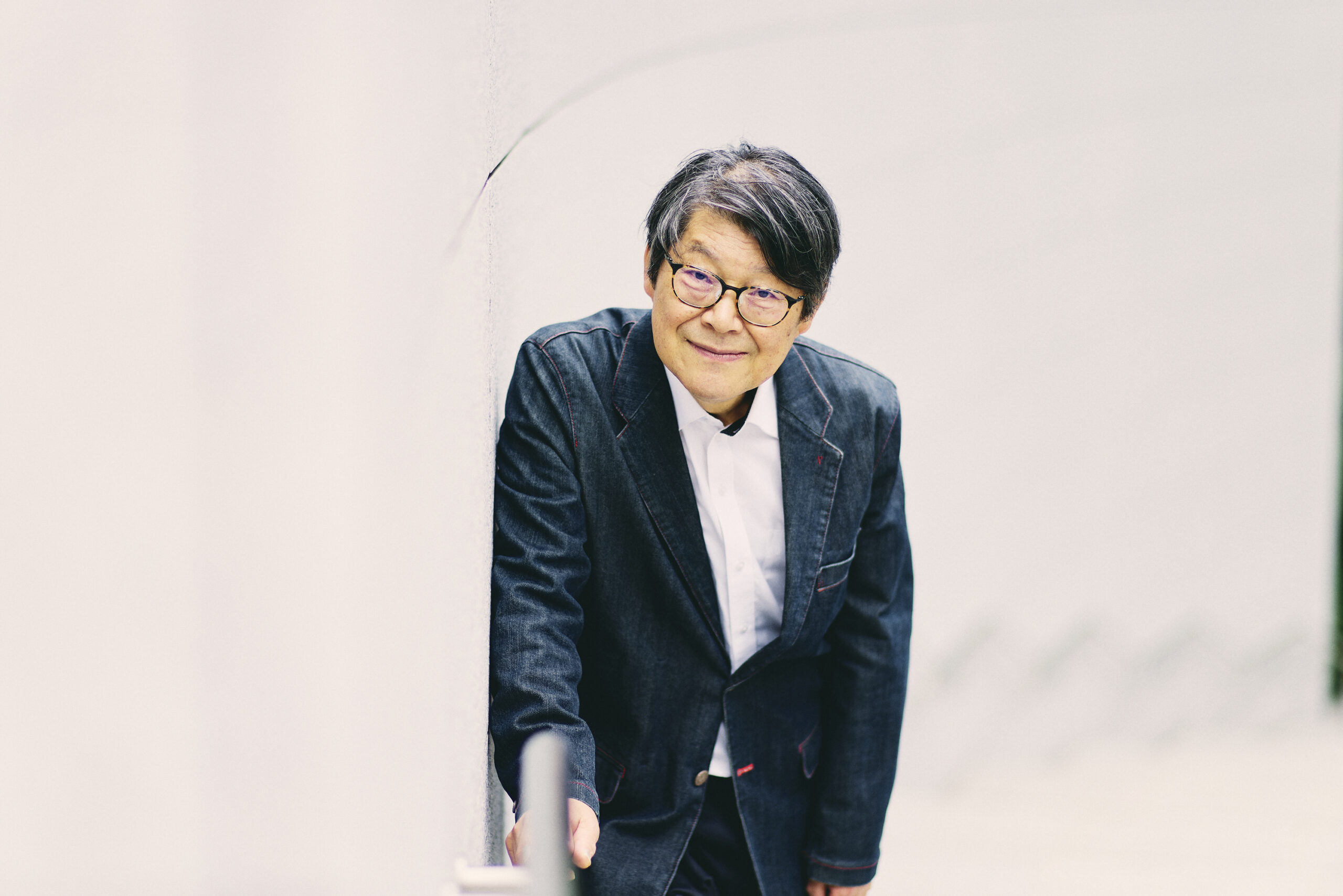
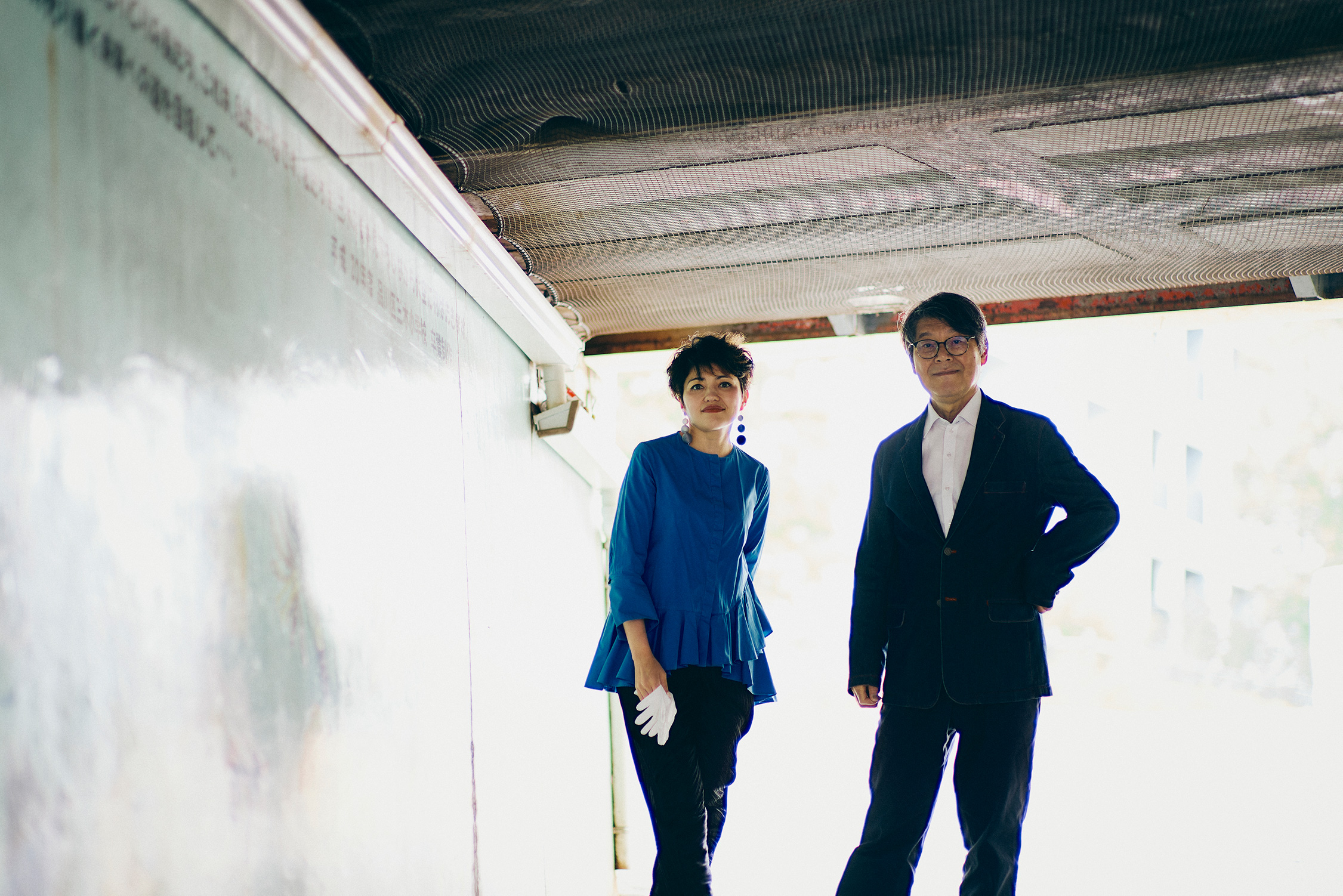
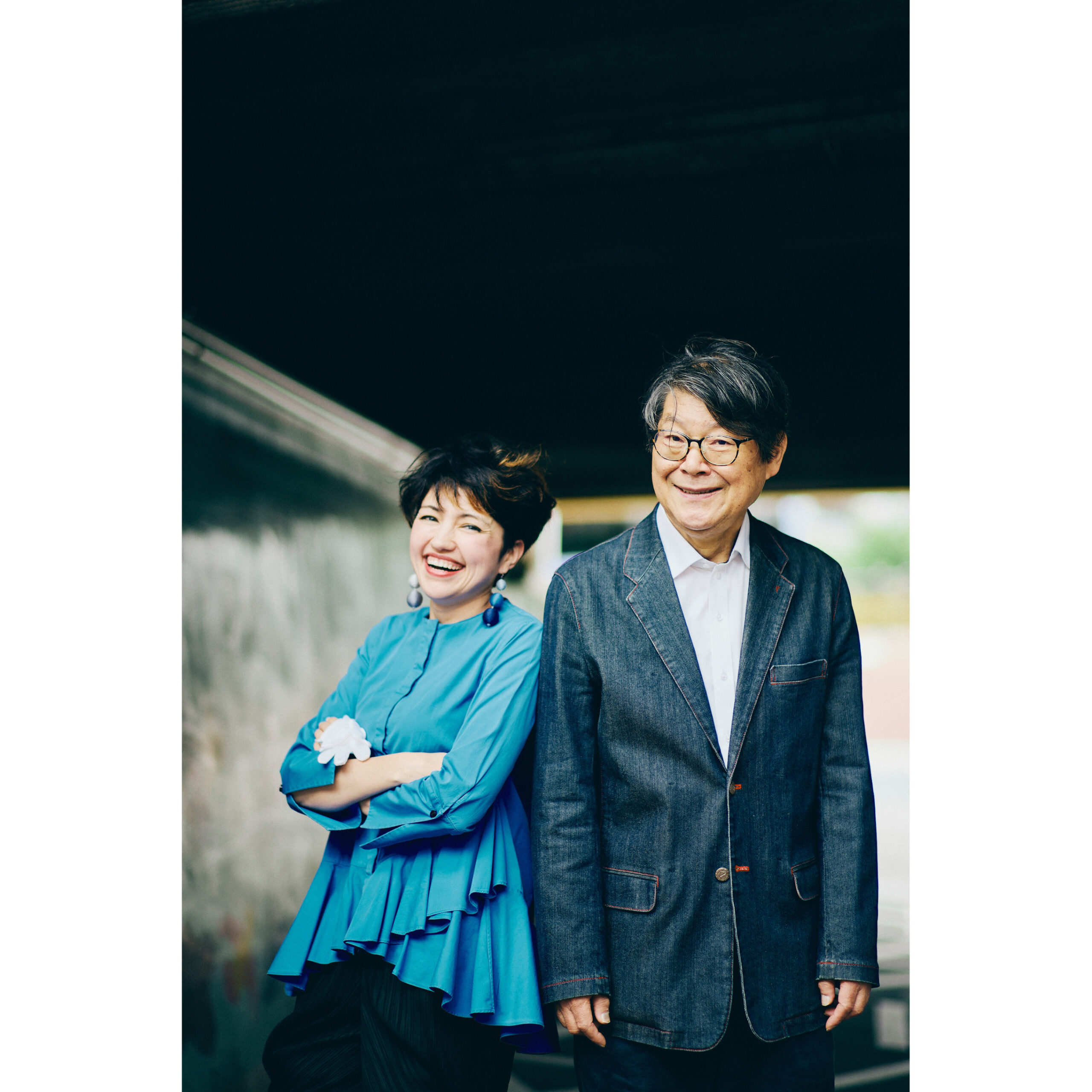
Erika Colon/Born in Venezuela
The founder/Artistic Director of the White Hands Chorus NIPPON and a professional soprano singer
Born in 1979. After her graduate studies at the Sacred Heart University in Tokyo (Master in Education), she completed her Master’s degree at the Royal Academy of Music in London. She has won both the Grand Prix and Song award at the 2019 Tokyo International Singing Competition for the first time in history. She has released a CD with King Records titled “Bridge”. While performing at music festivals in Italy, France, and England and continuing to perform at home and abroad, she is teaching children with visual, hearing, and other disabilities as the artistic director of White Hand Chorus NIPPON. She is the mother of four siblings.
Instagram:erikacolonsoprano
X:@erikacolonnn
Tetsuya Izaki/Born in Saga prefecture
Hand singing supervisor of the White Hands Chorus NIPPON and gestural group teacher/Advisor to the Japanese Theatre of the Deaf, actor
Born in 1952. Graduated from School for the Deaf, University of Tsukuba. The founder of the Deaf Theater Company in Japan in 1980. Joined the professional deaf theatre in the United States, “The National Theatre of the Deaf” in 1982 as a member for one year and a half. After returning to Japan, he returned to the Japan Deaf Theater Company. He serves as a sign language class instructor at the “The Totto Foundation, a social welfare corporation , Totto Culture Center”. Appeared in “Shizuka-chan and Papa” broadcast on NHK in 2022.
Instagram:tetsuyaizaki
<White Hands Chorus NIPPON>
Web:https://elsistemaconnect.or.jp/activity/whc-nippon/index.html
X:@WHCNconnect
text by Rieko Kimura
photographs by Uta Mukuo
2025.10.09
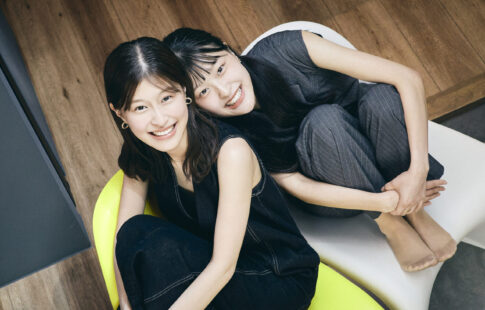
目次Until I accept my “Deaf self”A new scenery opened up by challengesBehind the 1 million You Tube […]
2025.10.09
目次Until I accept my “Deaf self”A new scenery opened up by challengesBehind the 1 million You Tube […]
2025.08.06

目次I was told that “I didn’t want to be born into a house like this”Hokkaido→ Yokohama→ Nagoya→ Yokohama […]
2025.08.06
目次I was told that “I didn’t want to be born into a house like this”Hokkaido→ Yokohama→ Nagoya→ Yokohama […]